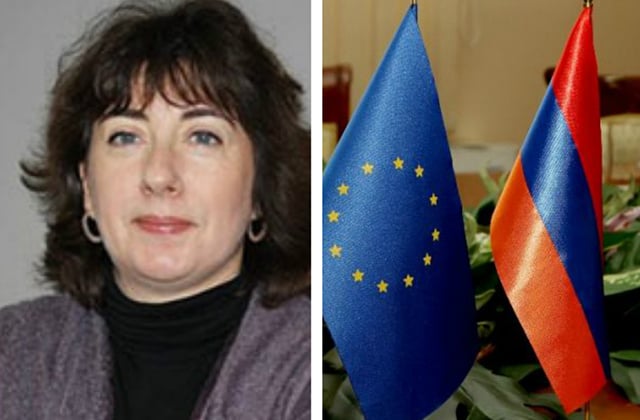After the April elections the date of signing Armenia-EU agreement will be shaped: European analyst

“Armenia-EU negotiations around the framework agreement will be concluded the following year,” Armenian FM Edward Nalbandian and Johannes Hahn, Commissioner for European Neighbourhood Policy and Enlargement Negotiations, told reporters recently at the press conference in Yerevan. The latter expressed hope that Armenia and the EU will finalize negotiations around the framework agreement during the forthcoming year, after which the EU will pass on to procedural activities with the participation of 28 EU member countries. How long will arrangements last and why negotiations have so prolonged? Laure Delcour, Professor at the College of Europe, former diplomat, Senior Research Fellow at IRIS (The French Institute for International and Strategic Affairs), reflecting to these issues told “168 Hours” that in 2013 after the crisis in Armenia-EU relations it would be not correct anticipating rapid speed in negotiations, in particular, under current situation of Armenia and the EU.
In her words it refers to internal and external challenges of both Armenia and the EU. “However, Yerevan press conference of the commissioner and the Ministers made several important accentuations to the sense, that hereinafter Eastern Partnership (EaP) will function by a different regime, in his speech the Commissioner highlighted dynamic work, Ministers of EaP member countries expressed their concerns linked to the program’s future, indicated their expectations, some of them—with a sharp tongue.
It was also obvious that this was perceptible for the European side, Hahn stressed that the EU has a unified position on the program’s future, essence of that position is that the EU Eastern neighbors are crucial partners for the EU. In my assessment this was a key record.
The next noteworthy circumstance was that there is desire to work transparently with EaP countries, which is really needed, also regarding Armenia-EU negotiations, as there is much uncertainty. Hahn introduced the EU’s global approach towards this region, the EU programs and lessons learned, which are a good milestone for EaP,” the European analyst said.
According to the latter other speed can’t be anticipated from the new stage of Armenia-EU negotiations, despite completed negotiations around the Association Agreement (AA). In her qualification, this is a process conditioned by complicated, multilateral, numerous factors. “Not accidentally, Johannes Hahn stressed the EU procedure. This supposes pre-signing, then further postponing of signing, which has not only European, but Armenian roots as well. Based on my information, the Armenian side anticipates signing the document until the April elections, and the European side won’t do it before elections, if desired, even processes of accordance wouldn’t be possible to extent until April.
However, besides the technical issue, ideological issue is existent as well: how will be elections held in Yerevan? What changes does Armenian president promise? How justified those promises are? Forthcoming elections are going to show that. I consider, after that the date of signing will be shaped,” Laure Delcour said, adding that further policy by the EU towards Armenia will also depend on the election results.
By Araks Martirosyan

























